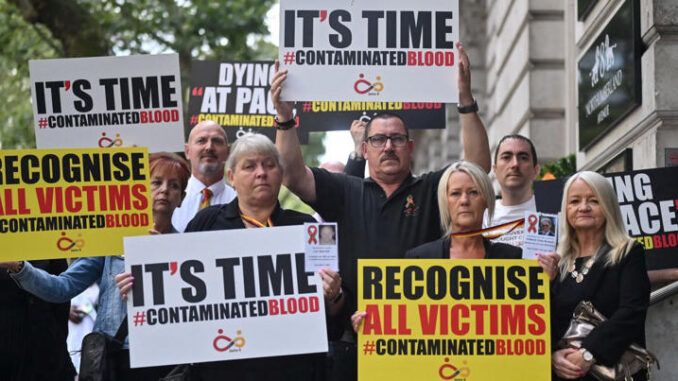
The true scale of the number of clinical trials that used infected blood products on children in the 1970s and 80s has been revealed.
Documents seen by the BBC reveal a secret world of dangerous clinical testing involving UK children, as doctors placed research goals ahead of the needs of their patients.

BYPASS THE CENSORS
Sign up to get unfiltered news delivered straight to your inbox.
You can unsubscribe any time. By subscribing you agree to our Terms of Use
Latest Video
Children as young as three were used to test whether blood treatments were contaminated with diseases and their families were not told when they later contracted deadly viruses.
This continued for over 15 years. It involved hundreds of children, most of whom were infected with hepatitis C and HIV.
The findings are the latest development in the infected blood scandal, which has widely been described as the “worst treatment disaster in the history of the NHS”.
BBC reports: The trials involved children with blood clotting disorders, when families had often not consented to them taking part. The majority of the children who enrolled are now dead.
Documents also show that doctors in haemophilia centres across the country used blood products, even though they were widely known as likely to be contaminated.
A shortage of blood products in the UK in the 1970s and 80s meant they were imported from the US. High-risk donors such as prisoners and drug addicts provided the plasma for the treatments that were infected with potentially fatal viruses including hepatitis C – which attacks the liver resulting in cirrhosis and cancer – and HIV.
One blood product, known as Factor VIII, was seen to be highly effective for stopping bleeding but also widely known to be contaminated with viruses.
A public inquiry is under way into the scandal. The final report is due in May.
‘Guinea pig’
Luke O’Shea-Phillips, 42, has mild haemophilia – a blood clotting disorder that means he bruises and bleeds more easily than most.
He caught the potentially lethal viral infection hepatitis C while being treated at the Middlesex Hospital, in central London, which was administered because of a small cut to his mouth, aged three, in 1985.
Documents seen by the BBC suggest he was deliberately given the blood product – which his doctor knew might have been infected – so he could be enrolled in a clinical trial.
The doctor wanted to find out how likely patients were to catch diseases from a new version of heat-treated Factor VIII. Though he had never been treated for his condition before, Luke was given heat-treated Factor VIII to stop his mouth bleeding.
A letter from Luke’s doctor, Samuel Machin, to another expert in haemophilia, was submitted in evidence to the public inquiry into the infected blood scandal.
Writing to Peter Kernoff, at London’s Royal Free Hospital, Dr Machin detailed the treatment of Luke and another boy, asking: “I hope they will be suitable for your heat-treated trial.”
Months earlier, Dr Kernoff had called on fellow doctors in the field to identify patients suitable for clinical trials. Specifically, he said, they had to be “previously untreated patients”, known as “PUPs” in the medical community.
They were also nicknamed “virgin haemophiliacs” – a term written on Luke’s medical record by Dr Machin.
“I was a guinea pig in clinical trials that could have killed me,” Luke told the BBC. “There is no other way to explain it – my treatment was changed so I could be enrolled in clinical trials. This change in medication gave me a fatal disease – hepatitis C – yet my mother was never even told.”
“To the scientific world, it was an incredible benefit being a virgin haemophiliac,” he added. “To be a clean petri dish to understand science through, I was without question a part of that.
In the following years, as the medical trial reached its conclusions, Luke had many blood tests. Doctors said they were monitoring him and, at the time, his mother, Shelagh O’Shea, was grateful.
In their findings, published in 1987, Dr Kernoff and Dr Machin concluded heat treatment had “little or no effect” in reducing the risk of hepatitis C.
Both Dr Kernoff and Dr Machin are now dead.
Before he died, Dr Machin gave evidence to the public inquiry, when he confirmed that Luke had been recruited to Dr Kernoff’s study.
He denied this had been done without Luke’s mother’s knowledge. “This would have been discussed with his mother, although I acknowledge that standards of consent in the 1980’s was quite different to what it is now,” Dr Machin said.
However, Mrs O’Shea told the inquiry she was “absolutely not” told about the trial. “With an innocent child of three and a half I would not have considered such an action. I would never ever have allowed my child to be part of a trial – never,” she added.
Documents reveal doctors knew Luke had contracted hepatitis C as early as 1993, but he was not told until 1997. One medical record states a positive test result and says: “Have not discussed with patient or family.”
Luke is now clear of the infection after successful treatment.
‘Laboratory rats’
However, evidence of the clinical trials have raised wider concerns.
“A patient should always be given the best possible treatment and they should always have given informed consent – if those two factors haven’t been achieved then a trial would be seen as very problematic,” says Professor Emma Cave, Professor of Healthcare Law at Durham University.
Professor Edward Tuddenham, who was a haemophilia doctor at the Royal Free Hospital in the 1980s, confirmed these fears. When asked if he thought ethical standards had been met during clinical trials in the 1980s, he simply answered: “No.”
The BBC’s investigation has revealed that Dr Machin and Dr Kernoff were among a community of doctors with similar research ambitions.
A specialist school near Alton, in Hampshire, was attended by a large cohort of haemophiliac boys. The school for disabled children had an NHS haemophilia unit on site, so boys who had bleeds could be treated quickly and then return to lessons.
Their doctor, Dr Anthony Aronstam – who has also since died – used his “unique” cohort of boys for extensive clinical trials. One series of experiments considered whether using three to four times more Factor VIII than normally required by a child would help to reduce the number of bleeds he had.
This was preventative treatment, know as prophylaxis, and involved repeated injections with infected Factor VIII products and follow-up blood tests. The high concentrations of infected blood products were administered to the boys without their – or their parents’ – consent.
Of the122 pupils attending Treloar’s College between 1974-1987, 75 have so far died of HIV and hepatitis C infections.
“Despite knowing the product was riddled with hepatitis, they started a trial that required us to have way more of it than we needed,” says Gary Webster, who was unknowingly enrolled.
Ade Goodyear, a pupil at Treloar’s from 1980 to 1989, added: “We were treated like lab rats. There was a plethora of studies that we were all enrolled on for the decade we were at the school.”


